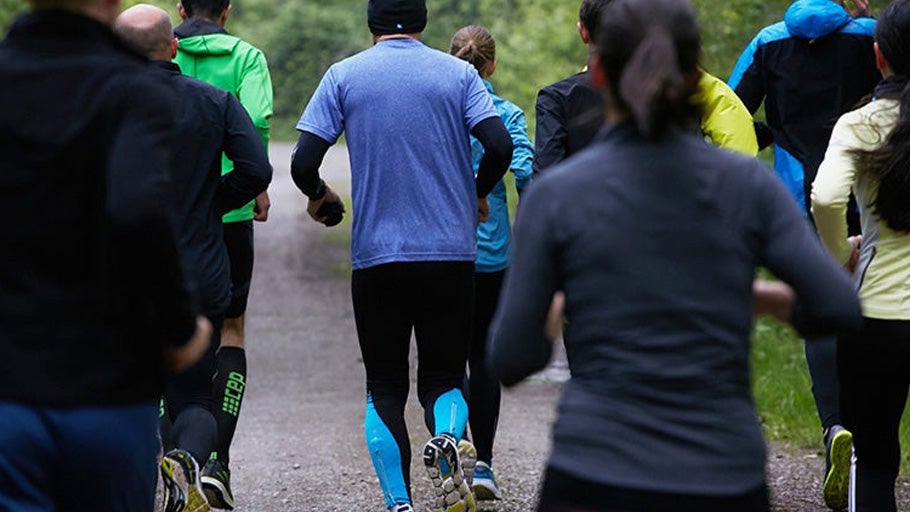
How to Taper and Prepare Before a Half Marathon
Whether it's your first race or your tenth, pre-race jitters never truly go away. That's part of why we run races: the excitement, the anticipation, the little bit of fear. All of these things can help push us to run our best, as long as we don't let them overwhelm us. Proper preparation, and having a plan for the day before your race can help eliminate a lot of unnecessary stress and set you up for success.
When it comes to race prep, the Running Warehouse staff has done our homework. With a staff full of cross country, track, road, and trail athletes and coaches, we've done things the right way (and, unfortunately, sometimes the wrong way), and we know what it takes to craft a successful race day.
Here is some of our top advice for laying down a successful foundation for your next Half Marathon effort.
The Taper
What is a Taper?
A "taper" is a period of training in which you reduce the intensity and amount of mileage you are enduring in the days leading up to an important event. For a half marathon, we recommend tapering in the two weeks before your race.
When you train, you are putting stress on your body. This stress is useful only if you allow your body to get the rest it needs to heal, adapt, and grow stronger after the effort. When you are out on a long run or doing a hard workout, you are not actually getting any stronger in that moment. Rather, you are providing your body with the signals it needs so that it rebuild itself stronger during periods of recovery.
Because of this, increasing your mileage and incorporating some speedwork in preparation for your half marathon, is advantageous in the months before a race, but you will need to allow your body a "comedown" period of time, or a "taper" window in order to adapt and gain the benefits of all that hard work. At the same time, you certainly don't want to lose any fitness. The goal is to keep your legs fresh without becoming a complete couch potato. This balance of allowing adequate recovery and maintaining fitness is where the magic of the taper comes into play.
How To Taper
Most runners will get the most benefit out of a 10 - 14 day taper. You can determine the start day of your taper by counting backward from race day by this many days. Exactly how long you taper for and the specifics of what it looks like will vary for each individual depending on fitness, experience, and a few other factors. If this is your first time tapering, we recommend you begin with a full two week taper.
Two Weeks Before a Half Marathon
The longest run of your training should occur about 14 days out from your half marathon. This will probably be about 10 - 11 miles long, but trust your coach or your training plan if they're recommending something a little different for you.
Following this long run, you will begin decreasing your mileage marginally, but the pattern of your training should not change too drastically! For example: If your body is used to Tuesday speed workouts, then you should still do a Tuesday Speed Workout. You don't want to rock the boat once your body is in a good rhythm. Instead, you will want to decreasing your mileage and intensity to about 60% of what you did in your biggest week.
- Your total weekly mileage should be about 60% of what your biggest week was. Don't decrease the number of runs you do, just make each run shorter.
- If you have been doing any weekly intensity (speedwork) runs, you should still do this workout - but decrease the amount of time you spend running hard so that it's only about 60% of what you would normally do.
The Week Before a Half Marathon
This week, your main goal is to keep your legs loose and fresh while keeping energy levels high and your mind calm. Your total weekly mileage should drop to about 40% of what you did in your biggest week (not including the mileage of the race).
- Reduce mileage to 40% of what you did in your biggest week, not including race day.
- If you normally include intensity, you can incorporate a couple efforts about 5 days out from race day. If you do not normally do speedwork, now is not the time to start!
- Use your extra time to focus on getting race day logistics dialed in, eating good quality nutrition, and enjoying the experience!
Plan Your Travel
Whether you're headed for a destination race or doing one in your own hometown, you should plan out how you'll get yourself to the starting line. Due to lane closures and delays in traffic, you can avoid unnecessary stress by knowing where you need to park, the distance from the starting line, and how to get back if your race has different starting and ending points. If your race offers shuttles, you should research their running times and pick-up locations. Planning out all of these factors in advance will allow you to arrive unrushed and with a calm mind.
Lay Out Your Gear
Avoid last-minute forgetfulness by laying out your gear and nutrition the night before. This will prevent you from leaving anything behind on the day of the race, and from running late because you couldn't find that one running sock hiding in the dryer. If you're traveling, it's best to pack all your running gear in the same spot so it will be easy to locate on race day.
A quick checklist, to ease your mental burden, would include:
- Race bib (preferably already pinned to singlet, with identifying information filled out on the back)
- Singlet
- Shorts
- Socks
- Shoes!
- Nutrition/Hydration packs if you're using them
- Subway pass, or other method of reaching the starting line
- Subway pass, or other method of returning from the finish line
Study The Course
Most modern Marathon and Half Marathon organizers do a fantastic job of providing you with all the maps, data, and information needed to prepare for their courses. From elevation charts that can clue you into the location of "the hill" or chat forums where former competitors can share their advice and wisdom, we recommend looking over whatever has been made available.
However, there's a fine line between being forewarned about a course's quirks, versus stressing yourself out, and trying to memorize every detail. In general, having a sense of which miles you'll need to persevere through, versus which ones the course will be kinder to you through, can give you the mental edge that you need to overcome all 13.1 of the miles that lay ahead.
Be Mindful of What You Eat
Carb Loading! Everyone gets excited by the prospect of an all-you-can-eat pasta and bread buffet the day before a race — and yes, you should be loading your body with fuel for the effort ahead. BUT, it is still important to stay healthy, and now is not the time to overdo it. Choose foods that are familiar to your diet, and which your body can digest easily. You can adventure eat AFTER your race, but for the days right before, high-quality carbohydrates are your best friends so that your body will have readily accessible energy for race day.
Be Mindful of What You Drink
Hydration is essential, but that doesn't mean that you need to drink liters upon liters of water in preparation for your race. Overhydration has much more serious consequences than dehydration. Regardless, make sure that you are drinking when you are thirsty, getting plenty of electrolytes, and avoiding excess alcohol and caffeine the day before your race.
Prepare Your Body
Your training plan has probably recommended that the day before the race be very easy, and you should hold onto that concept when it comes to other physical activity throughout the day. If you want your legs to be fresh for your race the next day, it's probably not good to get in one more long run, spend the entire day walking, or go for a strenuous bike ride. Another part of preparing your body for the race is ensuring that you get enough sleep the night before. Though those pre-race nerves may keep you up, do your best to go to bed early and get plenty of rest before your race.
Prepare Your Mind
A reoccurring theme of this article is finding ways to keep stress low.
So, one more time, loud and clear in its own section: Take some time to get into the right head space for your race. Hopefully, you have already had some time to figure out your goals and intentions for the day ahead. Do you want to place? Do you want to beat a particular time? Do you just want to finish? Are you there to try hard, or is it more important to you to have fun? Identifying these things ahead of time will set realistic expectations for your half-marathon and can help you to walk away from your effort feeling satisfied and fulfilled.
Go Race with Confidence
With your taper complete, your wardrobe assembled, and a game plan in mind, you won't have to worry about anything holding you back from chasing down your goals. Preparing all of the above in advance can allow you to keep all of your focus on running your best in the morning.
Now, all there is to do is to get some rest, and then to enjoy your race!
Good luck!

















